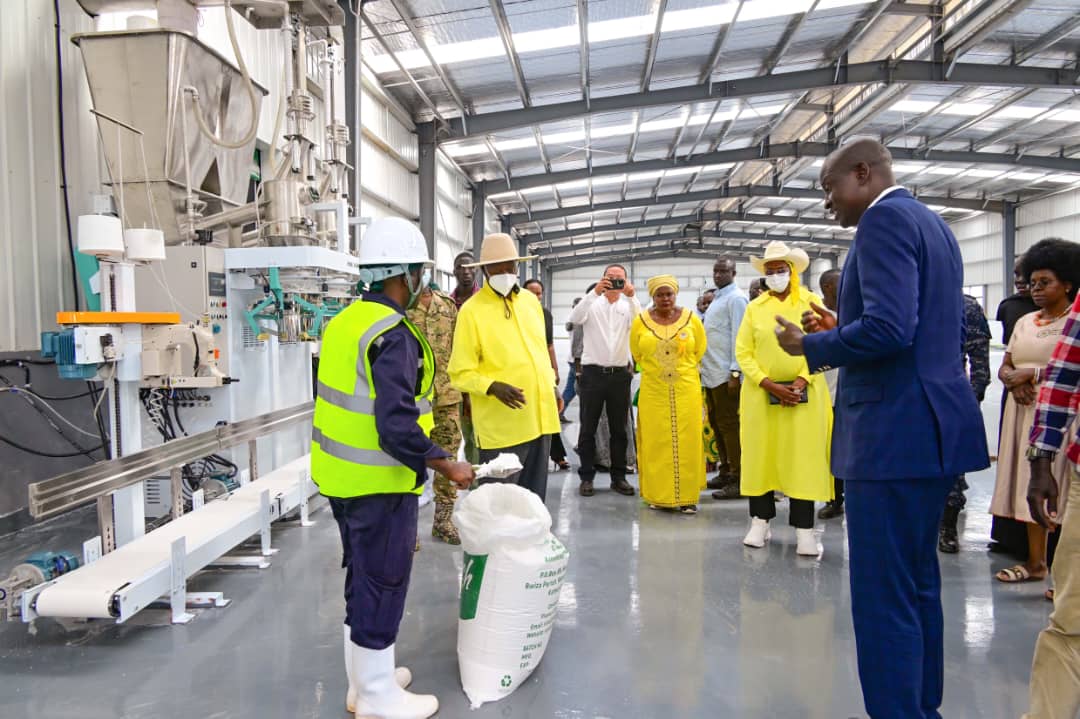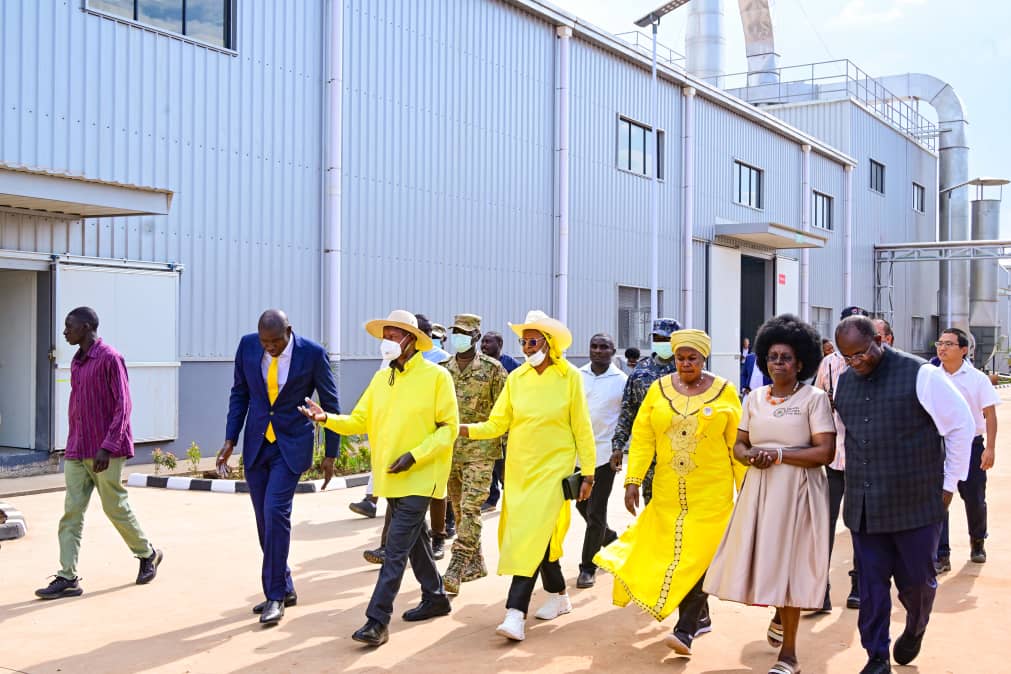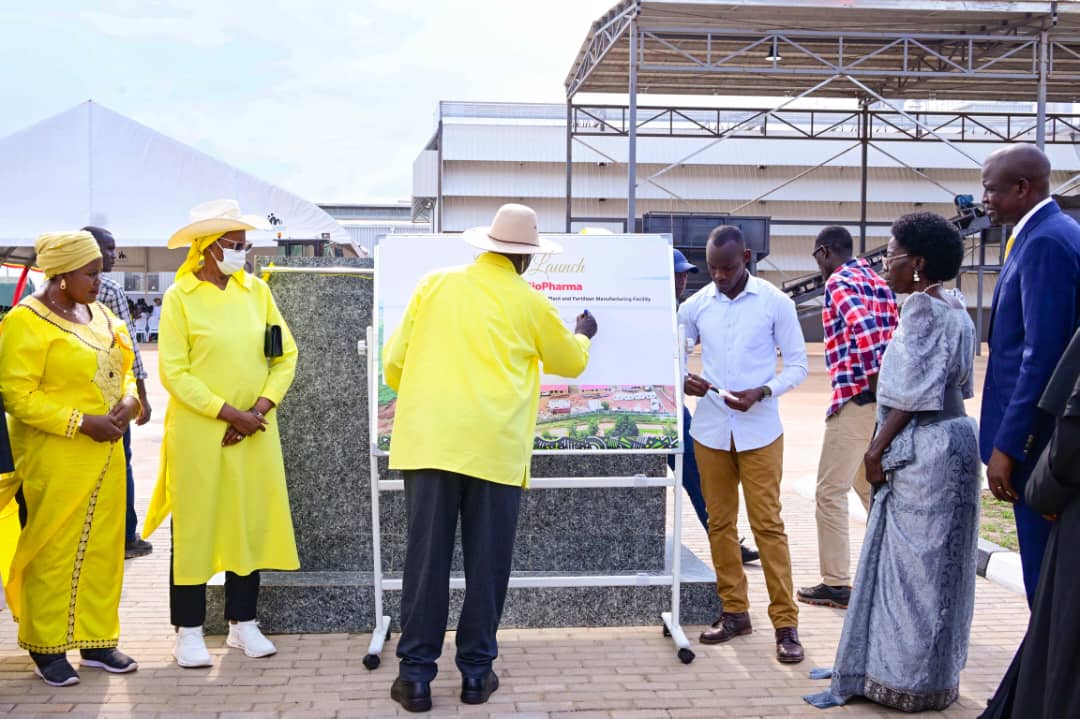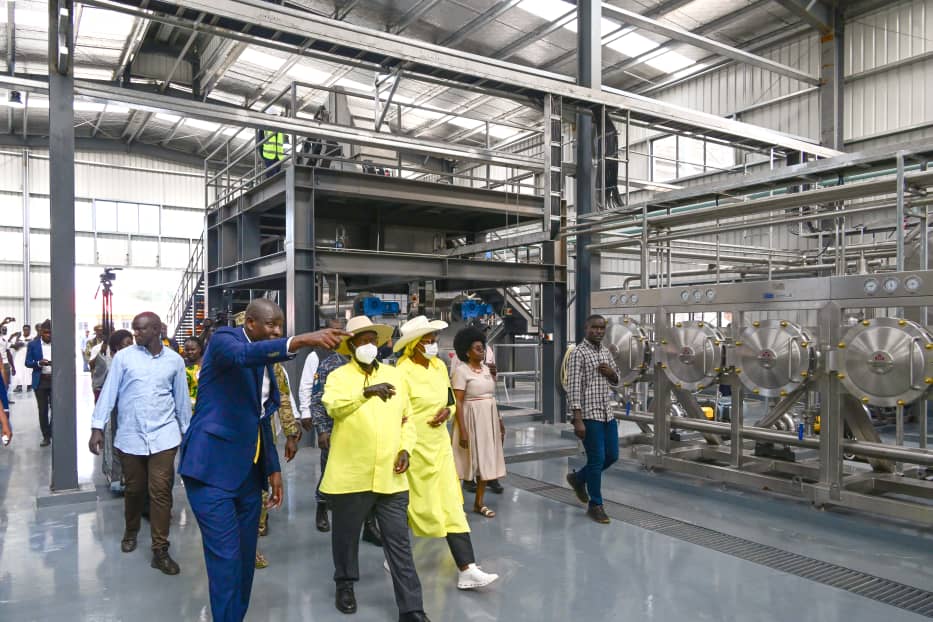President Museveni on Thursday launched the Dei Biopharma Advanced Agro-Processing and Biotech Park in Namasagali, Kamuli District, a project led by Uganda scientist Dr. Matthias Magoola.
At the same ceremony, President Museveni also commissioned the Dei Biopharma cassava starch manufacturing plant a $ 50 million investment, marking a decisive step in Uganda’s quest for pharmaceutical self-reliance.
The factory will produce starch, glucose, and maltose for pharmaceutical and food industries.
The firm plans to extract more than 100 derivatives from cassava, maize, and potatoes. The facility will require 500 metric tonnes of cassava daily.
This project forms part of a larger $10 billion investment plan to establish a biotech hub, including a 1,000-bed hospital for sickle cell and cancer treatment, and a vaccine facility.
President Museveni, who has consistently supported Dr Magoola's pharmaceutical ventures, praised the entrepreneur's innovation.
“I met this young man through my uncle, and I helped him when he had some issues. Now I appreciate his innovation and I will continue supporting him,” Museveni said.
He encouraged Dr Magoola to forgive critics, adding: "I don’t know why Africans don't like innovation; they are used to sleeping. Africans like to criticise. Congratulations, Magoola, but forgive everyone disturbing you. That’s how I also started fighting, and people thought I was mad.”
President Museveni highlighted the importance of industrialisation, noting that industries employ 1.3 million people compared to 480,000 civil servants.
Dr. Magoola explained that nearly 99 percent of starch and other ingredients for tablet and capsule production are imported, making African pharmaceuticals expensive.
“We are among the first companies in Africa to manufacture our own pharmaceutical ingredients...The facility aims to make quality medicines affordable for Ugandans and Africans, creating jobs and driving industrial growth,” Dr. Magoola said.
President Museveni praised Dr. Magoola for his resilience and innovation, sharply criticizing individuals who had previously frustrated the scientist’s efforts.
“I want to congratulate Magoola as a very innovative young person,” President Museveni said.
“Africans don’t like innovation. They are used to sleeping. They don’t want new things. Africans need to critique themselves and support new individuals with innovative ideas because I know young people can have very good ideas. Even when I started fighting, some people thought I was mad,” Museveni added, saying that Uganda’s indigenous knowledge, long overlooked, was increasingly proving its global value.

“These Americans have come here to support this work. Now all these other foreigners should know there is ancient knowledge here, and this knowledge can help the whole world. Regarding cassava, all these are gold mines because they are needed in the world. This is all wealth. But Africans are sleeping.”
The starch plant, represents the first phase of the ambitious Dei Group Advanced Agro-processing Park, an industrial zone designed to supply locally manufactured excipients and active pharmaceutical ingredients, or APIs, to the company’s drug manufacturing complex in Matugga, and also for export to regional and international markets.
The president on the same day also commissioned the Dei Group’s Organic Fertilizer Plant in Nansololo, Kamuli, part of the park in which Dr. Magoola, revealed the group intents to invest upto USD 10 billion in the next 10 years.
The starch plant will serve as a cornerstone for local drug production and a crucial lifeline for farmers. It is set to create a high-volume, reliable market for cassava, requiring about 500 metric tons of the crop daily.
This demand is expected to provide a significant alternative for farmers across Busoga, Bukedi, Lango and Teso, regions historically dominated by sugarcane farming, which often leaves smallholders vulnerable to price volatility and poverty.
“Our decision to invest in starch production is strategic — to make Uganda competitive in drug manufacturing by reducing dependence on imported inputs,” said Dr. Matthias Magoola, founder and managing director of Dei Biopharma.

Magoola noted that Africa currently imports up to 85 percent of all essential medicines, largely because the continent lacks facilities to produce base pharmaceutical ingredients.
He explained that almost 99 percent of the starch and other excipients used in tablet and capsule production are imported, driving up the cost of local manufacturing and rendering it uncompetitive.
“By producing our own starch, glucose and malt sugars here, we close a critical cost gap,” he said.
The company strategically chose Namasagali for its geography and logistics. Located along the banks of the River Nile and near Lake Kyoga, the site easily connects to major cassava-growing regions, including Northern Uganda, Teso, Busoga and even parts of the Democratic Republic of Congo.
Dei Biopharma has already registered more than 3,000 farmers and distributed Nilocus-1, a high-yield cassava variety developed by Ugandan crop scientists.
Magoola said the shift to cassava would significantly improve farmer incomes, projecting that a cassava farmer could earn roughly triple what a sugarcane farmer earns on the same piece of land due to the crop’s shorter growing cycle and higher returns per kilogram.
While pharmaceutical-grade starch is the flagship product, the plant’s applications stretch into broader industrial sectors. The facility is now producing glucose, maltose, or malt sugar, and two grades of fructose, key ingredients in beverage, food and drug manufacturing.
Magoola revealed the company is starting with five products, but plans to eventually extract more than 100 derivatives from cassava, maize and potatoes, including Sarbitol, marnitol and dextrose.
The facility is equipped with technology to modify starch for specialized uses and to produce vitamin C and other sugar derivatives critical to pharmaceutical production. Once approved by the U.S. Food and Drug Administration, Dei Biopharma expects to export its pharmaceutical-grade starch and intermediates to markets across Africa and the Global South.
Magoola also emphasized that cassava offers dual benefits — both food and income — which helps address the food deficit created by the over-reliance on sugarcane in Busoga.
The starch factory is one component of Dei Biopharma’s broader agro-industrial blueprint on its 5,000-acre estate. The fully integrated hub will include the organic fertilizer plant producing organic inputs from animal waste, and a biotechnology complex for veterinary vaccines, including a Foot and Mouth Disease vaccine facility with a capacity for 100 million doses annually.

By establishing an end-to-end manufacturing chain — from the farm to the finished pharmaceutical product — Dei Biopharma aims to position Uganda as a regional center for biopharmaceutical innovation.
The $50 million investment is part of a larger $10 billion, 10-year plan to transform the Busoga region into a regional biotech and agro-industrial hub.
The company’s Matugga facility, partly operational, is designed to manufacture a range of essential medicines, from intravenous fluids to oncology drugs.
Magoola said the addition of the Namasagali starch plant completes a key part of the supply chain, ensuring raw materials are locally sourced, costs are reduced and production becomes globally competitive. “The ultimate goal,” he emphasized, “is to make quality medicines affordable to every Ugandan and every African.”
On the same day, Dr. Magoola announced plans to establish a 1,000-bed specialist hospital within the park, dedicated to treating sickle cell disease, cancers and rare genetic disorders.
The move seeks to redefine access to advanced therapies for millions of Africans. Dr. Magoola said the new hospital would provide clinical treatment using advanced gene and cell therapies, aiming to cut the cost of curative treatments like Lyfgenia and Casgevy — currently priced at over $2 million per dose internationally — by 99 percent.
Dei Biopharma plans to use its intellectual property and Uganda’s status under the WTO’s TRIPS provisions for least developed countries to manufacture approved treatments locally, projecting the cost of a full sickle cell cure could fall to between $10,000 and $50,000.
Inside the $10 Billion Dei BioPharma Vision to Revolutionise Sickle Cell, Cancer Treatments and Biotech Innovation in Uganda
The Dei Group, owners of iconic Ugandan biotech firm, Dei BioPharma Ltd has embarked on plans to establish a 1,000-bed specialist hospital in Kamuli District dedicated to the treatment and research of sickle cell disease, cancers and rare genetic disorders— a move that could redefine access to advanced therapies for millions of Africans living with the inherited blood disorder.
The proposed facility will be located inside the company’s 5,000-acre Advanced Agro-Processing and Biotech Park in Namasagali, Kamuli.
It marks the next phase in Dei Biopharma’s broader biotechnology investment plan — one that seeks to position Uganda as a continental hub for pharmaceutical innovation, raw material production, and gene therapy research.
According to the Founder and Managing Director Dr. Matthias Magoola, the new facility will provide clinical treatment for sickle cell and other rare diseases using advanced gene and cell therapies.
“We are setting up a 1,000-bed hospital to treat sickle-cell disease and rare conditions,” he said. “Our goal is to cut the cost of these treatments by 99 percent and make them accessible to Africans who have long been priced out of life-saving innovations.”
A Regional Answer to a Global Inequality
Sickle cell disease (SCD) remains one of the most pressing yet underfunded public health challenges in Africa. While gene-editing breakthroughs such as Lyfgenia and Casgevy — both approved by the U.S. Food and Drug Administration (FDA) — have offered hope to patients globally, their staggering price tags make them unattainable for most.
Lyfgenia costs about USD 3.1 million per dose, while Casgevy is priced at USD 2.2 million.
“These are single-dose, curative treatments,” Dr. Magoola explained, “but they remain beyond reach for the very populations most affected. Africa accounts for 80 percent of global sickle cell cases, yet less than one percent of those who need treatment can access it. In Uganda alone, 80 percent of children born with sickle cell don’t live past the age of five.”
The World Health Organization estimates that Uganda ranks fifth globally in sickle cell burden, following Nigeria, India, the Democratic Republic of Congo, and Tanzania.
For Dei Biopharma, the Kamuli facility represents both a humanitarian and scientific response to this inequity.
Dei Biopharma plans to use its intellectual property portfolio — and the capabilities of its flagship biotech firm already valued at over USD 5 billion — and its status under the WTO’s TRIPS (Trade-Related Aspects of Intellectual Property Rights) provisions for least developed countries to manufacture approved treatments locally without infringing international patent law.
“Because we are a least-developed country, TRIPS allows us to produce these medicines legally,” Dr. Magoola said. “We already have the technology for Lyfgenia and are developing our own treatment for sickle cell. The approval process for our version will take time, so our first priority is to make existing therapies available faster and more affordably.”
By localising production, Dei Biopharma projects that the cost of a full sickle cell cure could fall to between USD 10,000 and USD 50,000 — a reduction of more than 95 percent compared to current international prices.
The Kamuli complex forms part of a USD 10 billion ten-year investment plan to transform Busoga into a regional biotech and agro-industrial hub. Beyond the sickle cell hospital, the company is constructing a starch manufacturing plant with a daily processing capacity of 500 metric tons of cassava, and a Foot and Mouth Disease vaccine facility capable of producing up to 100 million doses per year.
The broader ecosystem, dubbed the Dei Group Advanced Agro-Processing Park, will integrate the production of active pharmaceutical ingredients (APIs), excipients, and biotechnology derivatives from cassava, maize, and other local crops. “We’re creating an advanced agro-industrial ecosystem — not just processing raw material, but extracting high-value components used in global drug manufacture,” Dr. Magoola said.
Raising Africa’s Innovation Profile
The company has filed more than 100 patent applications across pharmaceuticals, biotech, and advanced materials — part of a vision to elevate Africa’s global innovation standing.
“In the West, you find single companies valued higher than Africa’s GDP,” Dr. Magoola observed. “That is because we have been low on innovation and patents. What we are doing will change that. Through science, Africa is going to rise.”
The group plans to list on the Uganda Securities Exchange next year as part of its expansion drive and expects its valuation to grow exponentially as production scales up across its 30 manufacturing lines.
“This is not just for Uganda. “It’s for Africa as a whole. For the first time, we will be making our own excipients, APIs, and vaccines to global standards. "


